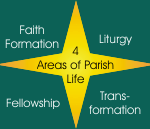

 |
|
 |
|
Homily for July 10th, 2005.
Caution: Putting a Sunday homily on the Website is tricky business. All the viewer has is a written text. A homily, on the other hand, is "an oral event". It may not have been said or heard the way it was written. In addition, a roughly ten-minute homily is part of a roughly one-hour worship event in which God and God's people communicate with each other by means of ritual, symbol, song, proclamation, prayer. Not everything in these homilies is original. As a homilist, I rely on and at times borrow from other homilists and writers who are not properly mentioned in this format. I am often indebted to them. Father William Marrevee, s.c.j.
15th Sunday Ordinary Time A What is the point of having this sort of story (parable; Matthew 13:1-9) proclaimed as Good News? Why would Jesus bother to tell us such a seemingly harmless story? We are all familiar with the scene. We sow seeds; some don’t make it; some do. Believe it or not, but with this parable Jesus gives us a hint of what is really going on in our world, in our own personal lives, in our church…; to be more specific, what God is doing in our world. Yes, the sower of the story is an image of God. And what God does is sow seeds that bring forth life. In this case God is not a threatening, a punishing, a revengeful, a destructive God (Jesus does not know that sort of God), but a God who is generous to the point of prodigal in the way he brings forth new life in our world. Really the Gospel story is not any different from what we heard in the first reading or what we sang in the psalm; even the second reading fits into it. What these Scripture readings, each in their own way, summon us to is to have faith in God who will not stand for it that our world, that our church, that our personal lives go to pieces. Yes, some of the seed that God sows will be eaten up by the birds, some will be scorched by the sun and wither away; some of it will be choked by thorns and weeds; in spite of it all, God sows and God sows. Cost efficiency is not part of God’s marketing strategy. God is unrelenting and lavish in sowing seeds that will produce their crops. It is a mixture of stubbornness and tenderness that marks God’s dealings with us. In that sense, the parable is an encouragement, a summons to hope. The ground for our hope is not the condition of the soil…., but the lavishness of the One who sows: a gracious God who does not first make a feasibility study before he starts. No, God sows and sows generously. We move and live in a world which is not just our narrow space, but it is even more God’s space, a space in which a gracious God slugs it with us and shows us the way. And the path that God shows is, in spite of everything, a path that leads to life. Of course, there is another side to the coin. Yes, God sows; that is a given, and it comes first. But are we receptive to what God sows? Are we cooperative agents so that what God sows can produce the fruits that God intends? |
|||||
| © Copyright 2025 Our Lady of Victory / St-Malachy Site
490 Charles Street • Gatineau • Quebec • J8L 2K5 Telephone: (819) 986-3763 Website powered by Arvixe Web Hosting |